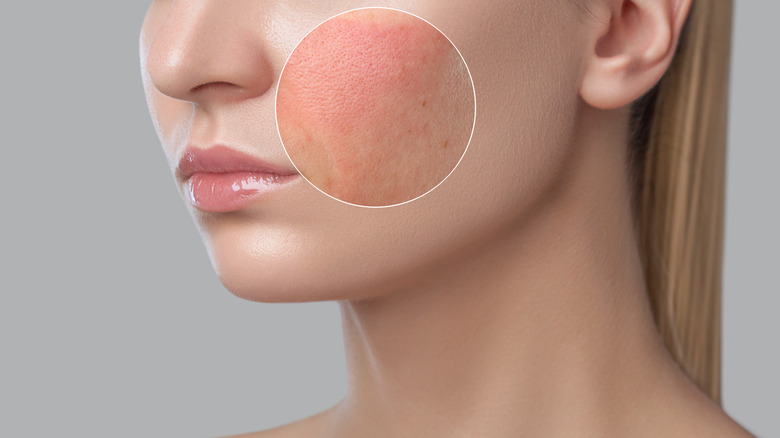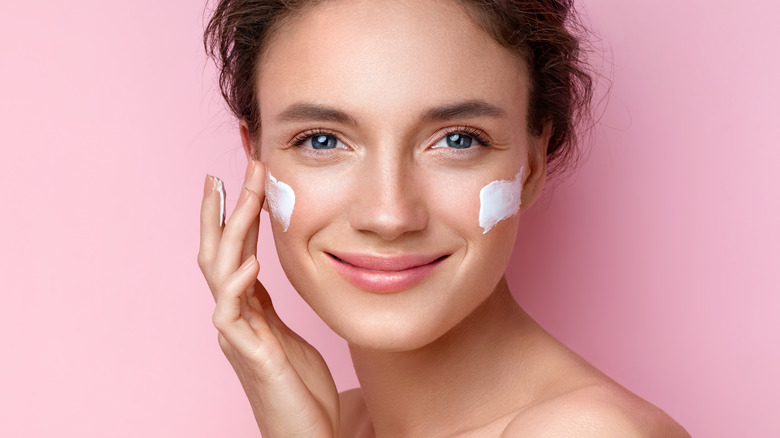Signs You Have Damaged Your Skin Barrier
Awareness regarding skin concerns like maskne and blue-light exposure has increased this past year. As a result, skin care has increasingly come into the spotlight. But with all the skin care treatments out there, it's easy to be overzealous with active ingredients and forget that the most important part of skin care is to protect your skin barrier by being gentle with it. Also known as the moisture barrier or its scientific name, stratum corneum, the skin barrier refers to the outermost part of the epidermis, which is the top layer of skin (via Byrdie). The barrier is similar to a brick-and-mortar structure where the skin cells, or keratinocytes, are like the bricks, while lipids and proteins act like the mortar in between (via Byrdie and Glamour).
The barrier's main function is to keep moisture in the skin by hindering transcutaneous evaporative water loss (TEWL), and to block irritants, per Glamour. According to ScienceDirect, TEWL is the natural loss of water from the skin through evaporation. The barrier is also slightly acidic, which prevents the growth of bacteria and fungus on the skin, per Healthline.
Skin barrier damage can be caused by environmental factors like UV exposure, high winds, or pollution, as well as lifestyle choices like smoking or nutrient-deficient diets. Skin care routines are especially important in preserving your barrier. Using stripping facial cleansers, face scrubs and/or over-using exfoliating acids can all damage the barrier, as well, because they can irritate the skin and throw off its natural pH levels.
What skin barrier damage looks like
When your skin barrier is damaged, your skin will show signs of irritation, including hyperpigmentation, itchiness, and dehydrated skin (via Byrdie). In more severe cases, you may be prone to skin infections and/or delayed wound healing. For those who have rosacea or eczema, you might be more susceptible to flare-ups.
According to Glamour, you may also notice redness, scaly skin, and inflammation. Dermatologist Mona Gohara told Glamour that you could get rashes. Sean Garrette, a licensed esthetician, said a major sign of skin barrier damage is a stinging or burning sensation on your skin even when applying products that don't contain active ingredients like moisturizers. With a damaged barrier, skin also becomes more acne-prone. Skin may have a shiny appearance and feel tight with skin texture looking more exaggerated, per COSRX.
To prevent skin barrier damage, it's important to not overdo actives in your skin care routine (via Glamour). Dermatologist Shereene Idriss recommends introducing one active ingredient at a time. Over-exfoliation can especially lead to inflammation. To prevent this, it's recommended to stick to exfoliating acids like AHAs or BHAs and to avoid scrubs that can cause irritation. "Over-exfoliating is one of the biggest mistakes we see people making," dermatologist Aanand Geria told Healthline, adding, "Generally, skin should be exfoliated only one to two times per week to help expedite skin cell turnover without causing damage."
How to treat a damaged skin barrier
Following a "less is more" approach to skin care is key to repairing a damaged skin barrier, per Glamour. "This also includes avoiding all makeup as well. The thought of this is terrifying to my patients dealing with damaged skin barriers, but the short-term disturbance of quitting it all is worth the long-term gain of clear and smooth skin," said Idriss, who recommended Aquaphor Healing Ointment. Garrette says people with damaged skin barriers should stop using products with active ingredients for two to three weeks, including exfoliants, retinol, and vitamin C. Instead, Garrette recommends hydrating and soothing ingredients like hyaluronic acid, ceramides, squalane, and centella asiatica.
According to Healthline, ceramides are lipids that already exist within your skin barrier. So using moisturizers with ceramides can help replenish the skin and repair the structure of the barrier. Make sure to layer serums with humectants like hyaluronic acid and follow afterward with occlusive moisturizers. Humectants draw in moisture into your skin, while occlusive ingredients help seal in the moisture. Healthline also suggests plant-based oils like jojoba or coconut to help repair the skin barrier and preserve moisture in the barrier. These oils also have anti-inflammatory properties which can help soothe damaged skin. Just remember, using a hydrating moisturizer twice a day can help keep the dermatologist away.


